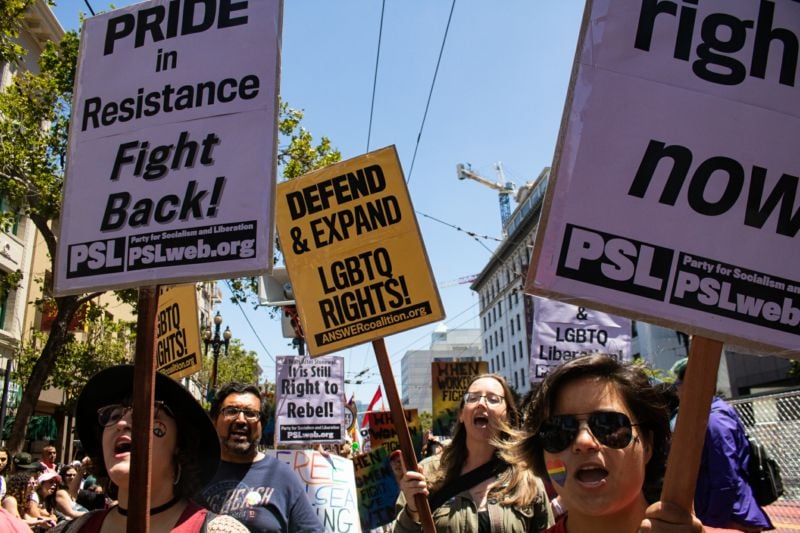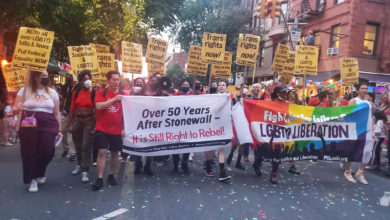In his recent joint address to the U.S. Congress, President Joe Biden told transgender youth, “Your president has your back.” But without a strong people’s movement to hold him accountable, these words will remain empty. Like other progressive concessions forced to the table by militant mass demonstrations, LGBTQ legal equality is possible in this political moment if we don’t rely on those in power to act benevolently, but demonstrate that these are demands that millions of people will not rest until they have achieved.
May 17 is the International Day Against Homophobia, Transphobia and Biphobia. May 17 was selected for the day of awareness in 2004, but its roots go back through decades of struggle by German LGBTQ people to whom May 17 (written 17/5 in Germany) was known as the “gay days” since Paragraph 175 of the German legal code was the passage that criminalized “sodomy.” Under the Nazis, this law sent tens of thousands of LGBTQ Germans to concentration and death camps. In socialist East Germany after World War II, enforcement of this law ended in the 1950s, and by 1967, it was totally removed from the books. But in capitalist West Germany, Paragraph 175 persisted until 1994, four years after reunification.
Today, May 17 is commemorated in more than 130 countries. In Cuba, street marches and events hosted by the National Center for Sex Education (CENESEX) celebrate the struggle of Cuban LGBTQ people, who have become an integral part of the socialist revolution and made Cuba a world leader in LGBTQ rights.
Bigots try to turn back the clock
Here in the United States, the struggle for LGBTQ liberation has grown strong and the tide of public opinion has shifted in favor of full legal equality. For this reason and many more, reactionaries have opened a new offensive intended to turn back the clock. In 2021 alone, more than 250 bills discriminating against LGBTQ people have been introduced in state legislatures, the vast majority of them specifically targeting transgender people. Eighteen bills have been passed.
In Congress, the Equality Act stands closer to passage than ever before and bigots are desperate to block it. The bill would add sexuality and gender identity to the protections of the 1964 Civil Rights Act, giving LGBTQ people nationwide protection against discrimination. In Senate hearings, so-called “experts” called by Republicans told lawmakers trans women are rapists who pose a danger to cis women if allowed into women’s facilities, a disgusting echo of the artificial “bathroom bills” controversy they attempted in years past. They claimed trans women are not women but simply men in dresses, that transgender children are victims of pushy doctors and predatory trans adults bamboozled by “transgender ideology” and demanded their “protection.”
This hate has helped fan the flames of violence against LGBTQ people. So far in 2021, more than double the number of trans women have been murdered compared to this point last year, with at least 21 known killings. 2020 was the deadliest year ever recorded for trans women, with 44 people killed, the vast majority of whom were trans women of color, and at this rate 2021 will be even worse.
These killings often happen because of the embarrassment of straight men. The bombardment of messages denying that trans women are women combines with homophobia to produce a violent reaction, as straight men fear they have “done something gay” or been “trapped” by being attracted to or having sex with a trans woman and they lash out in anger in an attempt to erase the evidence or punish the trickster who “got” them. These feelings, deep-seated in patriarchal capitalist culture, are without a doubt amplified by these hateful bills and their messaging, which only reaffirms the importance of the popular rallying cry: “Trans women are women!”
How do we fight back?
Despite the hate, communities are successfully resisting. In North Carolina, strong protests in Raleigh and Asheville forced state lawmakers to throw out a bill banning trans women from playing women’s sports and another banning affirming healthcare for trans people under 21. In Arkansas, large demonstrations and an unceasing wave of phone calls and letters forced bigoted Governor Asa Hutchinson to veto a trans youth healthcare ban in an abrupt change of position, suddenly denouncing the bill as “overbroad and extreme!” However, the Arkansas General Assembly ultimately overrode his veto and made the ban law. In other states, like Texas and Montana, communities have also rallied against hateful bills.
Democrats have 50 votes in the U.S. Senate and Vice President Kamala Harris, a Democrat, has the tie-breaking Senate President vote. They should be able to pass the Equality Act and many of Biden’s other proposed progressive concessions if they vote as a united bloc. Instead, these measures are held hostage by the threat of a filibuster, a rule the Senate created requiring a 60-senator majority that has been used for decades to block progressive legislation.
The Democrats could easily remove the filibuster and ignore Republican objections if they had the willpower — or feared the popular fury that would ensue if they chose not to. Opinion polls show the Equality Act has a huge margin of support in the U.S. public, with 76% of adults supporting LGBTQ anti-discrimination protections. This is pressure we must bring by being in the streets, uniting the LGBTQ liberation fight with the labor movement and other mass movements by oppressed people.
As German communist writer Bertolt Brecht said, “If you fight you might lose, but if you don’t fight you’ve already lost.” LGBTQ people know what it means to fight, from Stonewall through the AIDS epidemic to today. When the working class unites we are an unstoppable force that strikes fear into the hearts of the ruling class, forcing them to grant us otherwise-unthinkable concessions in a bid to calm us. These concessions aren’t liberation, but they are important victories reminding us of the power we have as a class to change society if we act collectively.






